Expectations and rights of bereaved parents
Information sheet: Differences between stillbirth rights, policies and social expectations in Kenya
| Concept | Definition | Example | References for further reading |
|---|---|---|---|
| Rights/laws | These are legal rights identified in Kenya’s Constitution and enforced by the court or through formal grievance procedures. | According to the Kenyan constitution, Health Act 2017 No.21 part 5: § Every person has the right to the highest and attainable standard of health which shall include progressive access for provision of promotive, preventive, curative, palliative and rehabilitative services. § Every person shall have the right to be treated with dignity, respect and have their privacy respected in accordance with the Constitution and this Act. | The Health Act No. 21 of 2017 |
| Rules & policies | A set of guidelines that an agency or an individual aim to follow. They outline your rights and may be governed by law or not. For example, a hospital policy may be to provide care and respect to patients. | Nairobi Hospital Policy | Quality policy statement - April 2020 |
| Social expectations & preferences | These are expectations or rules that every society has. As individuals we have our own ideas of how we would like to be treated. These preferences are not governed by law or policy, hence cannot be enforced as rights. | In the Kenyan culture there are social expectations related to being a woman, being a mother, being from a particular part of the country, and belonging to a specific religion, and sometimes these expectations may conflict. | Okwako, Joseph M., and Andrew G. Symon. "Women's expectations and experiences of childbirth in a Kenyan public hospital." African Journal of Midwifery and Women's Health 8, no. 3 (2014): 115-121. |
We may have concerns that we believe are related to our rights, but they are not considered as rights by either law or policy. However, this does not mean we cannot advocate for these to be considered as rights as we seek to facilitate change.
Information sheet: Respectful bereavement care
Respectful bereavement care is the support given to benefit bereaved parents to help them deal with the emotional and practical challenges experienced after stillbirth. At the hospital, this is usually facilitated by providers. Considering the components of respectful bereavement care (see the box below) can help clarify what parents bereaved by stillbirths are entitled to at the hospital.
The above is adapted from the Respectful Bereavement Care curriculum prepared by Still A Mum.
Information sheet: Global rights and policies related to stillbirth
- In addition to the stillbirth-related rights that are granted to women and families by Kenyan law and policy, there are also global rights and policies that are relevant for families bereaved by stillbirth in every country. Knowing about these global rights and policies can help families to be aware of, and push for, better care during and after stillbirth.
- In every country, women have the right to available, accessible, acceptable, and good quality healthcare. Assuring this set of rights can help to prevent stillbirths and to ensure families receive respectful bereavement care when stillbirth happens.
- Two main global documents reflect these rights:
- In 2014, the World Health Organization issued a statement for respectful maternity care calling for the protection of a woman’s “right to dignified, respectful health care” and “ending disrespect and abuse during childbirth”.
- In 2018, the updated Respectful Maternity Care Charter was published; it states that high-quality maternity care supports and upholds the dignity of both the mother and the newborn. The Charter sets out how these human rights should be guaranteed in pregnancy and childbirth care.
- In 2016, a key series on stillbirth was published in the global medical journal, The Lancet, which emphasized that this global rights framework means that supportive, respectful care in pregnancy and childbirth, including after a stillbirth, is a core part of high quality healthcare for all women.
- To be high quality, such care must also be context-specific and culturally acceptable, according to the best available evidence globally about what matters for families. For example, parents in all countries should be given the option to hold a baby who has died, yet the bodies of stillborn babies in many countries are often disposed of without any recognition, name, clothes, or funeral.
- Women (and all people) have fundamental human rights, including “the highest attainable standard of physical and mental health”. Respectful bereavement care is a part of this. It includes an acknowledgment of stillbirth and help for families to respond in their own ways.
- Empowerment of parents is critical to transforming these global rights into reality, through education and awareness raising, equitable decision making, woman-focused care, and greater access to resources. In fact, realizing global rights can improve health outcomes, including the prevention of stillbirths and appropriate respectful care for parents after stillbirth. Health workers’ and communities’ norms of complacency and fatalism related to stillbirth are common roadblocks.
- Ultimately, acknowledgment of women’s rights to respectful care during and after childbirth can support the development of a common understanding of, and commitment to, respectful care during and after stillbirth as well.
The content of this Fact Sheet is paraphrased from de Bernis L, Kinney MV, Stones W, ten Hoope-Bender P, Vivio D, Leisher SH, et al. Stillbirths: ending preventable deaths by 2030. The Lancet. 2016;387(10019):703-16
Information sheet: Potential roadblocks in the way parents' rights, preferences and expectations related to stillbirth care
- You have learned a bit about some of the rights you have related to stillbirth care, and also about some of the policies and expectations that relate to this care.
- You also probably know from experience that such care is not always provided. It can be helpful to consider the possible roadblocks to different elements of respectful bereavement care. As you review the fact sheet below, think about how you might work to overcome some of these roadblocks.
| You may have a right, preference, or expectation to… | But you may experience some roadblocks … |
|---|---|
| Ask for an autopsy/post-mortem |
|
| Experience compassionate communication |
|
| Receive adequate information about the cause of stillbirth |
|
| Hold your baby and spend some time with him/her |
|
| Create memories, including spending time with your baby, or taking hand and footprints, photos or locks of hair |
|
| Care and support from family, friends, peer groups or professional counselors that can help navigate grief |
|
| Privacy as one experiences the overwhelming emotions of grief and to also minimize interaction with nursing mothers and babies |
|
| Exploring options on how to handle the baby’s body, which will help to support informed decision-making based on preferences and values |
|
DIG DEEPER!
Resources and studies

This document explains the differences in rights, policies and preferences in advocacy work.Learn more
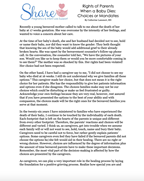
Right of a Parent When a Baby Dies: Choices or Mandates
This paper explains the rights a bereaved parent has at the hospital or facility.Learn more
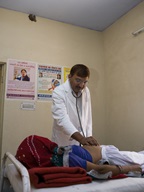
This charter clarifies and clearly articulates the rights of women and newborns for respectful maternity care within a healthcare setting.Learn more

Respectful care during childbirth in health facilities globally: a qualitative evidence synthesis
This study synthesized data on respectful maternity care from 67 studies in 32 countries, and showed the existence of a wide range of types of care beyond...

Stillbirth: economic and psychosocial consequences
This paper provides a global overview of the financial, emotional and psychosocial costs of stillbirth for women and families.Learn more

The roar behind the silence: why kindness, compassion and respect matter in maternity care
This book acknowledges the challenges faced by health workers in providing quality respectful care, especially related to the culture of fear and blame,...
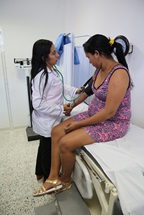
This commentary lays out the World Health Organization’s principles for quality care, including providing a definition of quality care as safe, effective,...

This report from the Lancet’s Commission on Women and Health Commission calls for valuing, compensating and counting women in health care (both as...

Survival convergence: bringing maternal and newborn health together for 2015 and beyond
This comment provides context to the Lancet’s 2014 Every Newborn series which accompanied the United Nations’ endorsement of the Every Newborn...

Stillbirths: why they matter
This foundational paper was one of the first to lay out the global situation of stillbirths and call for increased attention. It was the first paper in...
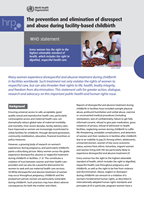
This formal statement from the World Health Organization clarifies respectful care during birth as a human right and lays out actions to be taken to address...
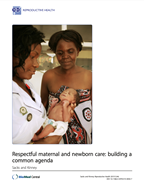
This commentary calls attention to the rights of newborns, including newborn babies who are stillborn, to receive dignified respectful care.Learn more

Review and appraisal of the implementation of the Beijing declaration and platform for action and the...
This statement from UN Women details progress on gender equality and empowerment since the 1995 Beijing Conference on Women.Learn more

Community-based intervention packages for reducing maternal and neonatal morbidity and mortality and...
This global review summarized the evidence on interventions for preventing maternal and newborn mortality and morbidity, including stillbirth prevention.Learn...

Women’s groups practicing participatory learning and action to improve maternal and newborn health in...
This review summarized evidence for whether women’s groups are effective in reducing maternal and newborn mortality and morbidity, including stillbirth...

.png?sfvrsn=6d0e27cd_1)



